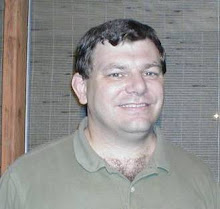We installed a new elder at church today. I always reacted negatively when people in my previous tradition used the term 'install' in this context, as they used the term to avoid thinking of the concept of ordination. But in this case, it was an installation: the gentleman was already an ordained elder who had served another Presbyterian church in the past. For Presbyterians, elders and deacons are considered fully ordained ministers; and once you're ordained, you're ordained for life. If you move to a new church, you bring your ordination with you.
But active service as an elder or deacon is limited to three-year terms. Warren was asked to serve out the term of an elder who had to resign due to changing job duties, but all Presbyterian churches have a yearly rotation of fresh elders and deacons who are replacing others whose three year terms have ended. The body of actively serving elders is called "Session."
It's a healthy way to keep fresh leadership in the church. Our church nominates elders and deacons who reflect the congregation--women and men; young and old (including one youth group member serving on Session most of the time). While it's not a public thing due to Presbyterian politics and respect of individuals' private lives, I assume that some of the elders are gay or lesbian. So Session is continually recharged with fresh faces and fresh perspectives.
But while the makeup of Session changes each year, ordination is for life. When not actively serving on Session, elders and deacons still serve communion, serve on the Stephen Ministry (a group of trained lay counselors), and play many other vital roles in the church. When our pastor, Peg Pfab, asked all ordained elders and deacons to come forward to lay their hands on our new member of Session, more than half of those in attendance came forward.
This is a good balance. Most of the churches I have been a part of in the past had trouble moving forward because of stagnant, self-perpetuating leadership that had been virtually unchanged for a long time. Yet a danger of elder rotation is that truly gifted leaders might not be adequately utilized. The concept of "ordained, but not actively serving on Session" frees gifted leaders to lead in other ways.
Scripture gives much latitude in these matters, but my impression of Presbyterian polity is that it is healthier than most.
Sunday, February 11, 2007
Subscribe to:
Post Comments (Atom)

No comments:
Post a Comment